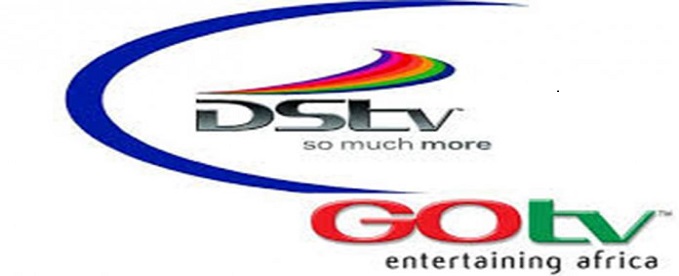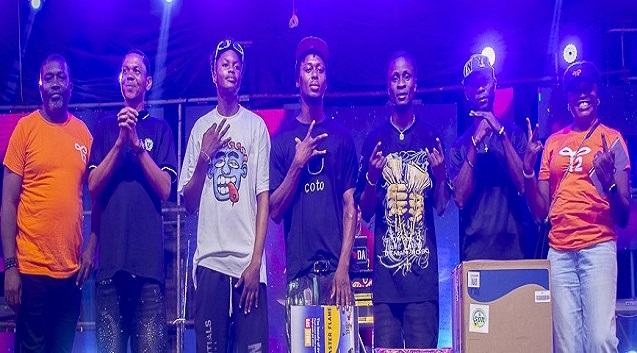Broadcasting
FCCPC Refuses to Challenge Multichoice over Hike of DStv, GOtv Subscriptions @ Tribunal

Federal Competition and Consumer Protection Commission (FCCPC) has declined to oppose the preliminary objection of Multichoice Nigeria, Pay-TV operator, which challenged the jurisdiction of a court sitting in Abuja that recently restrained it from increasing the prices of its DStv and GOtv packages.

Nikiomari Abeke, counsel for the FCCPC, told the Competition and Consumer Protection Tribunal (CCPT) on Thursday that he was not opposing the application of Multichoice Nigeria.
Recall that the he tribunal had restrained MultiChoice from increasing its subscription rates pending the hearing and determination of a motion on notice filed by Festus Onifade through Ejiro Awaritoma, his lawyer,.
Onifade, who sued Multichoice Nigeria Ltd, had accused the former of unjustly increasing subscription fees without one month’s notice to customers, seeking interim orders against the Pay TV.
A three-member tribunal, chaired by Saratu Shafii, had ruled in favor of Onifade by restraining Multichoice in the interim, in the suit marked CCPT/OP/2/2024.
The court held that “the 1st Defendant(Multichoice) is hereby restrained, whether by themselves, her privies, assigns by whatsoever name called, from going ahead with impending price increase schedule to take effect from 1st May 2024 pending the hearing and determination of the Motion on Notice already filed before this Honourable Tribunal.”
But M.J. Onibanjo (SAN), Multichoice’s lawyer, filed a preliminary objection urging the court to decline jurisdiction on the suit filed by Festus Onifade because such price dispute case had been decided before in favor of his client.
Onifade also asked the tribunal to direct Multichoice Nigeria Limited to pay the sum of N1 billion or any amount the tribunal deemed fit in this circumstance for “deliberately disobeying, contravening, and failure to comply with the Interim Order of this Honourable Tribunal granted on the 29th April, 2024.”
At the resumed sitting, Onibanjo tendered and adopted the previous judgment of the tribunal in suit no CCPT/OP/1/2022(Exhibit A), alongside his application, saying when a court had determined an issue between the same parties on the same subject matter before, that matter cannot be re-litigated again by any tribunal or court.
“This tribunal cannot sit on appeal on its decision. This tribunal is bound by its own decision in Exhibit A; that it is not the forum where the claimant can come to seek to regulate the prices and services offered by Multichoice,” Onibanjo said, urging the tribunal to strike out the suit.
On his part, Onifade argued that the issue he placed before the court is whether Multichoice Nigeria gave adequate notice in respect of the May 1, 2024 price TV subscription increase, and not price regulation or increase.
“It is our submission that the eight-day notice issued by Multichoice Nigeria is insufficient in law. A monthly subscriber should be given at least a month.
The FCCP counsel, Abeke, said his client “is not in opposition of the first defendant (Multichoice) and to that extent, no process and no counter was filed to the motion of the first defendant.”
After hearing from the parties, the three-man panel chaired by Justice Thomas Okosu adjourned the suit to June 7 for ruling.
Multichoice announced new price adjustments on DStv and GOtv packages on Wednesday, April 24, 2024.
Broadcasting
DG NCC Tasks University Dons on Research Commercialization, IP Management to Build Global Competitive Ecosystems

Dr. John Asein, director-general, Nigerian Copyright Commission (NCC), has charged universities to leverage Intellectual Property (IP), innovation management and research commercialisation to build vibrant, sustainable and globally competitive ecosystems.

The DG stated this while delivering a paper on: ‘’Research Commercialisation, IP Policy and Innovation Management’’ at the Committee of Vice-Chancellors of Nigerian Universities (CVCNU) organised Business Clinic themed: Unlocking University-Driven Business Ecosystems: Innovation, Partnerships and Sustainable Enterprise Models in Abuja.
The programme was targeted at engaging Vice-Chancellors, principal officers and other key officers in Nigerian Universities in a practical dialogue on how to transit their institutions into thriving business ecosystems through innovation, enterprise development and strategic partnerships.
In his presentation, Dr. Asein, disclosed that Universities are now recognised as engines of national development and innovation hubs that must connect scholarship to business.
He noted that with over 300 Universities in Nigeria, there is need for structured pathways to turn ideas into commercial outcomes while attention should be focused on IP assets in our universities in order to harness them in a safe, sustainable and satisfactory manner.
The DG NCC speaking further on leveraging resources from the creativity locked up within the university system, harped on the need to harness the soft power of our youth as Nigeria’s most valuable natural resources are its people.
Drawing demography from Nigeria youthful population, he observed that over 70 percent of Nigerians who are under the age of 30 are mostly in the university system studying. These youths, he noted, shape cultures, technology and innovation through creativity and digital skills.
He tasked universities to become innovation factories where young people can explore ideas, protect their IP and grow startups by integrating innovation culture, entrepreneurship training and IP awareness into its learning environment.
He equally urged Universities to look beyond the sciences to commercialize traditional knowledge-based innovations and harness the potentials in the creative arts disciplines like music, visual arts, theatre arts and others for commercial outcomes.
Dr. Asein, recommended that universities as centres of learning, should take the lead in using the IP system for promoting education and learning, wealth creation, revenue generation and institutional development.
Underscoring the need for all universities to have an IP Policy, he noted that the Model developed by the Nigerian Copyright Commission in partnership with the CVCNU is a good starting point.
The Secretary-General, CVCNU, Prof. Andrew Haruna, presented the welcome address at the event while the Director, Technology Innovation and Commercialisation, NOTAP, Mrs. Adah H.N. Mokolo-Oladunke represented the Director-General, NOTAP at the event.
The 2025 CVCNU Business Clinic witnessed attendance from representatives of Public and Private Universities across the 36 States in Nigeria.
Broadcasting
US invests $115m in counter-drone tech for World Cup security


Drone
The US Department of Homeland Security (DHS) will invest $115 million in counter-drone technology to safeguard the 2026 FIFA World Cup and events marking America’s 250th independence anniversary, creating a dedicated office for rapid drone system deployment.
Homeland Security Secretary Kristi Noem described drones as “the new frontier of American air superiority,” stressing the need to counter threats from drug cartels using unmanned aircraft for smuggling and surveillance, alongside incidents like a 2025 NFL stadium drone flight and 2024 New Jersey sightings.
The funding supports 11 World Cup host cities expecting over one million visitors, building on FEMA’s $250 million grants to those states and addressing risks heightened by cartels’ advancing tech, including a reported FBI tracking plot in Mexico.
DHS has conducted over 1,500 counter-drone missions since 2018, with the new Program Executive Office accelerating acquisitions amid President Trump’s border security push.
Broadcasting
Youth Talent Takes Center Stage as T2 Ignites High-Octane Rap Battles @ Carnival Calabar

The energy at the Carnival Calabar Music Concert reached a new high as T2 introduced a first-ever rap battle platform, giving young Nigerians an electrifying stage to showcase their talent, creativity, and self-expression while competing for exciting prizes.

Held at the U.J. Esuene Stadium, the activation blended pulsating music, vibrant culture, and youthful energy into a dynamic celebration that kept thousands of carnival-goers fully engaged from start to finish.
Eight fearless contestants stepped into the spotlight, going bar for bar in an intense lyrical showdown. Rappers fused local languages, pidgin, and sharp punchlines, creatively weaving the T2 brand into their verses.
Anchored by the energetic hosting duo MC Double I and MC Princess, the rap battles thrilled over 16,000 attendees, including the Governor of Cross River State, Senator Bassey Otu, delivering an unforgettable showcase of youth talent and cultural expression.
With prizes including fridges, gas cookers, sound systems, and airtime top-ups, the competition remained fierce throughout the night. After two high-energy rounds narrowed the field to a five-man final duel, Emmanuel Eye emerged as the overall winner, taking home the grand prize — a fridge.
“I never expected this at all,” Emmanuel said. “I came to the concert like anyone else, and hearing about the T2 rap battle was a surprise. When I got the chance to perform, I just went for it. Being named the overall winner is amazing, and I’m grateful to T2 for creating this platform to showcase our talent.”
Beyond the stage performances, T2’s presence added a digital layer to the carnival experience. As part of its role as Digital Technology Partner of Carnival Calabar, the brand introduced the MyT2 App as a lifestyle companion, while also enabling line reactivations, airtime top-ups, and instant rewards for hundreds of attendees, blending technology seamlessly into the live celebration.
Commenting on the activation, Chinelo Manefo, Specialist, Events and Sponsorship at T2, said:
“The energy from both the rappers and the crowd was incredible. This platform reflects exactly what T2 aims to create — a celebration of youth, creativity, and culture, enhanced by technology that connects people and experiences. Seeing the audience so immersed shows how music and performance can empower the next generation.”
The Carnival Calabar Music Concert, headlined by Tiwa Savage, Timaya, and top local performers, was further energized by T2’s interactive rap battle platform. By blending music, culture, youth expression, and digital innovation, T2 reinforced its commitment to championing Nigeria’s next generation, giving young creatives a stage to shine while enriching how they experience the festival.

 Telecom2 days ago
Telecom2 days agoSpacecoin Secures Licenses to Roll Out Satellite Connectivity in Nigeria, Kenya

 Telecom2 days ago
Telecom2 days agoGoogle Report: Nigeria Leads Global AI Adoption in Learning, Entrepreneurship

 E-Business2 days ago
E-Business2 days agoWhat the Retail and E-commerce Sector Should Expect in 2026 in Era of AI-driven Shopping and Privacy

 Telecom2 days ago
Telecom2 days agoAVEVA Names Khaled Salah Vice President for Africa to Drive Growth

 E-Financial2 days ago
E-Financial2 days agoFG Shops for N900Bn from Domestic Market with High-Yield Bonds

 Telecom2 days ago
Telecom2 days agoNetflix Switches Warner Bros. Bid to $27.75 Cash Offer as MultiChoice Secures HBO Future

 General News2 days ago
General News2 days agoTaraba Adopts Electronic Case Management System

 E-Financial2 days ago
E-Financial2 days agoCBN Raises Alarm over Loan Defaults by Households, Corporates



























